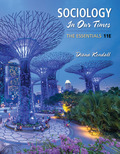
Introduction
In this age of information, it may not be possible to maintain privacy. The current notion of privacy may well be a myth already. Businesses and colleges should monitor digital communications to ensure employees are being consistent with the image of the organization. They can do this by checking social media during hiring or admissions processes. This also opens up a potential Pandora’s box, as the lines between one’s personal space and their professional identity may become blurred.
Explanation of Solution
Answer and explanation
(This question asks for a subjective response, the following is an example.)
I am not concerned about privacy because the notion of privacy is antiquated in the age of information. As more and more of our lives are loaded into the cloud in social media and the myriad of commercial and educational online accounts, the idea that all that data can be reasonably private is unlikely. A determined hacker could find out nearly anything they wish. Businesses and colleges should evaluate the digital footprints of applicants in order to weed out unacceptable people. For example, police departments should certainly remove any officer involved in white supremacy movements because such an officer cannot be trusted to protect and serve all citizens. Colleges could, and have, rescinded acceptance of people based on racist posts found online to protect the image and goals of the institution. This brings forth a question of whether people should expect that anything and everything they do in a public forum, such as social media, will be used in consideration of professional decisions.
Want to see more full solutions like this?
Chapter 5 Solutions
EBK SOCIOLOGY IN OUR TIMES: THE ESSENTI
- 2. How would you compare the lives of poor people living in the low-income nations of the world with those in cities and rural areas of the United States? In what ways are their lives similar? In what ways are they different?arrow_forwarddiscuss the critisism of functionslism theoryarrow_forwardHow have economic crises such as the Great Depression, the 2008–2009 recession, and the COVID-19 pandemic impacted families in both practical and emotional ways? How do these events continue to shape family life today? In what ways has the definition and structure of “family” evolved in the 21st century? How do these changes reflect broader shifts in societal values, gender roles, and legal recognition of diverse relationships? What are some of the major economic and social challenges facing families today, and how do these challenges differ across social class levels, particularly for working-class and middle-class families? How do you think the increasing visibility of same-sex families, domestic partnerships, and cohabitation without marriage will influence societal norms and policies around family in the coming decades? Given current trends, what do you envision family life will look like in the future—by 2030 or 2040? How might factors like technology, economic instability,…arrow_forward
- You have decided to study global wealth and poverty. How would you approach your study? What research methods would provide the best data for analysis? What might you find if you compared your research data with popular presentations—such as film and advertising—of everyday life in low- and middle-income countries?arrow_forwardWhat are the PROs and CONs of the Guardian Mindset basd on mindsets in policing by Mike D'Antonio in a TEDx Talks presentation?arrow_forwardDiscuss one example of each of these… A time that someone gave you legitimate criticism that you could learn from. A time that someone gave unfair criticism which you should not be hurt by. A time that you criticized someone, perhaps accurately, but you delivered your criticism so harshly that the other person could not take it in. How could you have said it better?arrow_forward
- prepare a written response which compares and contrast Zimbardo’s Theory of Individuation with Social Identity Theory.arrow_forwardhumanized/simple answers for each: How did the field of gifted education evolve, and why is it important for giftedness to be recognized as an exceptionality? How do we define “gifts and talents,” and how are students identified? What are some characteristics of students with gifts and talents, and how can the information processing model (IPM) help us understand their needs? Why do students from culturally and linguistically different or socioeconomically disadvantaged homes and twice exceptional student continue to be under-identified for gifted-educational supports and services? What educational responses are needed to address the strengths and challenges of students with gifts and talents? What life course considerations are important for students with gifts and talents?arrow_forwardConduct an Internet search for websites that could be either resource cites or listservs for individuals who have special gifts and talents. From this search, compile a list of 5–10 Internet addresses for (a) parents with children who have special gifts and talents and (b) educators.arrow_forward
 Social Psychology (10th Edition)SociologyISBN:9780134641287Author:Elliot Aronson, Timothy D. Wilson, Robin M. Akert, Samuel R. SommersPublisher:Pearson College Div
Social Psychology (10th Edition)SociologyISBN:9780134641287Author:Elliot Aronson, Timothy D. Wilson, Robin M. Akert, Samuel R. SommersPublisher:Pearson College Div Introduction to Sociology (Eleventh Edition)SociologyISBN:9780393639407Author:Deborah Carr, Anthony Giddens, Mitchell Duneier, Richard P. AppelbaumPublisher:W. W. Norton & Company
Introduction to Sociology (Eleventh Edition)SociologyISBN:9780393639407Author:Deborah Carr, Anthony Giddens, Mitchell Duneier, Richard P. AppelbaumPublisher:W. W. Norton & Company The Basics of Social Research (MindTap Course Lis...SociologyISBN:9781305503076Author:Earl R. BabbiePublisher:Cengage Learning
The Basics of Social Research (MindTap Course Lis...SociologyISBN:9781305503076Author:Earl R. BabbiePublisher:Cengage Learning Criminalistics: An Introduction to Forensic Scien...SociologyISBN:9780134477596Author:Saferstein, RichardPublisher:PEARSON
Criminalistics: An Introduction to Forensic Scien...SociologyISBN:9780134477596Author:Saferstein, RichardPublisher:PEARSON Sociology: A Down-to-Earth Approach (13th Edition)SociologyISBN:9780134205571Author:James M. HenslinPublisher:PEARSON
Sociology: A Down-to-Earth Approach (13th Edition)SociologyISBN:9780134205571Author:James M. HenslinPublisher:PEARSON Society: The Basics (14th Edition)SociologyISBN:9780134206325Author:John J. MacionisPublisher:PEARSON
Society: The Basics (14th Edition)SociologyISBN:9780134206325Author:John J. MacionisPublisher:PEARSON





